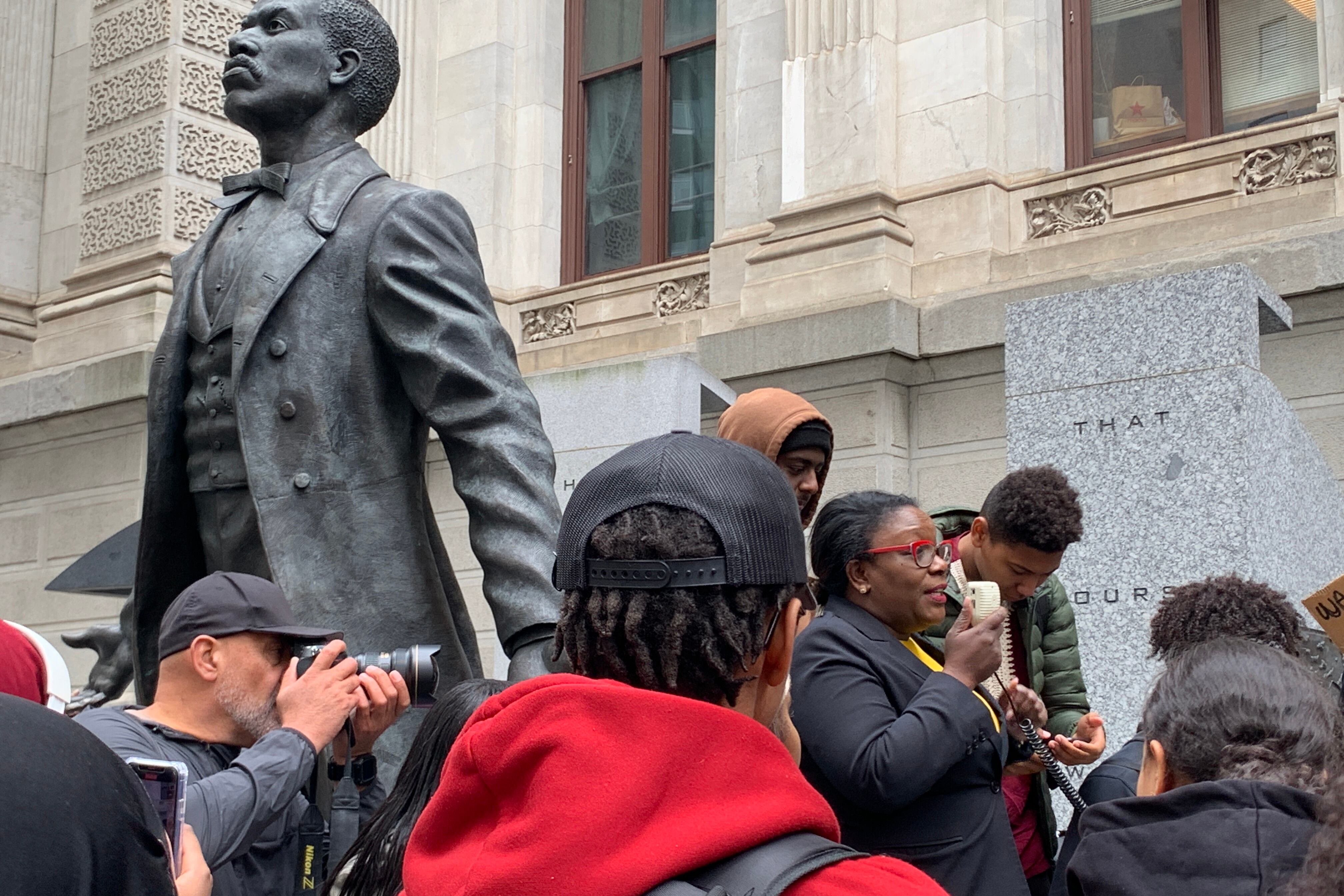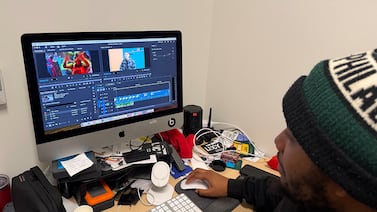Carrying signs with messages like “keep the teachers” and “save our schools,” more than 50 students from Science Leadership Academy at Beeber rallied outside City Hall Tuesday afternoon to protest Philadelphia’s revamped high school admissions process.
Two years after the district unveiled that new process, there are roughly 800 vacant spots next year at 12 of the district schools that require students to apply. Without a full complement of students, the schools could lose teachers and face cutbacks in extracurricular and other activities.
“We’re here to protest how the school system is pretty much messed up,” said Daniel Vergara, a sophomore at Beeber.
Not filling all the available seats in the school “means students are losing out on an education that they’re totally eligible for,” said Miriam Corrales, also a 10th grader. And Matthias Duncan, a senior, said that the changes could result in larger class sizes.
“Teachers shouldn’t be cut. It’s unfair,” said Jade Perry, another Beeber senior.
The ongoing criticism from students and others comes after a similar protest last week in which students and educators said that the district’s admissions lottery, which officials overhauled in 2021, is essentially endangering the survival of several themed and innovative high schools in Philadelphia.
At Thursday’s Board of Education meeting — immediately following last week’s protest — Superintendent Tony Watlington announced that the district would audit the lottery system with an eye toward refining and improving it.
The 2021 changes to the admissions system centralized the admissions process and eliminated the role of school principals in recruiting and admitting students. District leaders said the new system would make admissions more equitable for students of color. Last year, there were early indications that the share of Black and Hispanic students at the city’s four most-selective high schools increased for this year’s ninth grade class.
In a statement last month, the district said the revised system would “eliminate subjectivity and potential actions of implicit bias from the school selection process.”
Last week, Watlington said that 316 students who have qualified for admission to at least one of 12 schools but have not yet enrolled for next year would be offered a seat. He also said he would allocate $3 million to ensure that no high school will lose more than two staff members, “subject to principal discretion.”
But those changes haven’t quelled all of the anger about the system. A petition started by students to protest the admissions system, which circulated after Watlington announced changes to the lottery last week, is scathing.
“Our education is at stake!” it says. It goes on to say that having a lower enrollment at certain high schools “will cause class sizes of 35-40 students, 2-10 teachers to be lost, less funding for schools, fewer electives, and numerous other consequences. Why must the youth suffer from the incompetence of the School District of Philadelphia?”
As of Tuesday afternoon, the petition had about 250 signatures.
The students want the elimination of state standardized test scores as one of the criteria for admissions. They are also demanding “a sufficient school budget” and “adequate resources for learning.”
At Tuesday’s City Hall rally, the students heard from student speakers, as well as Councilmember Kendra Brooks, whose daughter graduated from Beeber, and state Rep. Amen Brown, a Democrat who is running for mayor.
“I’m proud to see so many young people out here rallying,” Brooks told the group. “We need the voice of those most impacted by this to stand up and fight.”
The students then marched up Broad Street to the school district’s headquarters to continue their protest.
Assistant Superintendent Tomas Hanna said the district appreciates the students’ passion and hears their concerns. He also said a committee that includes parents, teachers, and students is examining the admissions process.
Keeping a human element in school admissions
In the current system, which the district introduced for the class that is now in the ninth grade, students list five schools they want to attend, and are entered into lotteries for all of which they qualify. That means some students may be accepted to more than one school and others to none.
Watlington and the board said that the 2021 change was made in the name of equity. Yet last week, Watlington also said it is important not to “completely eliminate the human touch” from the admissions system.
Under the old admissions process, the district said in a statement last month, “Students were selected who did not meet the established criteria for the school. We also know at some schools there is not sufficient space, and students who did meet the criteria for the school were not selected.”
Tanya Wolford, the district’s director of research, told the Board of Education at its Thursday meeting that in the 2018-19 school year, 2,429 students accepted an offer to attend one of the selective schools, even though only 1,270 met the minimum admissions standards.
Board of Education President Reginald Streater cited his own experience Thursday to illustrate the perception in the community of the prior system’s unfairness. He attended Germantown High School more than 20 years ago – and had no complaints about his experience – but said that his mother told him it would be futile to apply to Central or Masterman because “you had to know somebody” to be accepted.
But the Beeber students and other critics, including some teachers, say the new system hurts those it was designed to help if it results in schools that can’t meet their usual enrollment. At Beeber, 83% of the students are economically disadvantaged and 80% are Black or Hispanic.
“We need an education that is well-funded and well-rounded,” the Beeber petition says. “Our education should not be jeopardized because the people in power will not admit that their attempt at equity failed.”
While the most selective schools have strict requirements, many smaller high schools established relatively recently, including U School and the LINC, often recruit students who don’t have stellar academic records but school leaders think could benefit. That could account for some of the students who attend these schools without meeting all the requirements on paper.
Video by WHYY Movers & Makers.
Dale Mezzacappa is a senior writer for Chalkbeat Philadelphia, where she covers K-12 schools and early childhood education in Philadelphia. Contact Dale at dmezzacappa@chalkbeat.org.






